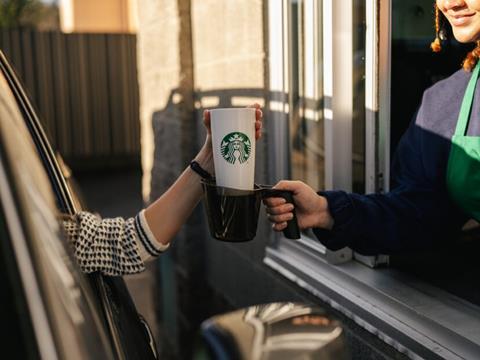
Reusable cups are now accepted in café, drive-thru, and mobile orders at all company-operated and participating licensed Starbucks stores in Canada and the United States – a move expected to bring the company closer to a 50% reduction in waste by 2030.
Through this development, Starbucks has reportedly become the first national coffee retailer in Canada to enable the use of personal cups for all drinks in all sizes when ordering on mobile. It hopes to help phase out single-use plastics and transition into reuse on a wider scale.
Consumers can bring a reusable cup into a Starbucks café and inform the barista when they order, at which point they will receive their drink in their own container. At most stores, a reusable ceramic or glass cup can also be requested for drinks to be consumed on the premises.
At the drive-thru, consumers can also inform the barista about their reusable cup and remove its lid. It will then be collected and returned at the pickup window using a contactless vessel, which is set to maintain hygiene and safety when handling personal containers.
Additionally, consumers using the Starbucks app can opt into using a personal cup in the customization menu before proceeding with their order. When they arrive at the store, they can hand over their cup without a lid, and the beverage will be returned to them in a contactless vessel.
In any case, anyone who provides a clean, reusable cup when ordering a drink at a Canadian location will receive a $0.10 discount. This is applicable to all standard size options (Short, Tall, Grande, Venti, Trenta) and beverage formats (hot, iced, and blended).
However, Starbucks emphasizes that all cups must be cleaned prior to ordering, as employees are unable to rinse dirty cups in equipment sinks for health and safety reasons.
“At Starbucks, we envision a future where every beverage can be served in a reusable cup,” said Michael Kobori, chief sustainability officer at Starbucks. “Offering customers more options to use a personal cup when they visit Starbucks marks tangible progress towards the future.
“We know our customers are passionate about the planet, and now, they can join us in our efforts to give more than we take, no matter how they order.”
“As we know, the most sustainable cup is likely the one you already own,” adds Kate Daly, managing director and head of the Center for the Circular Economy at Closed Loop Partners. “Bringing your own cup to stores is a critical step toward reducing single-use packaging waste.
“Starbucks is a leader in this work, as the first national retailer of scale to offer personal cup ordering for all beverages and sizes in every channel, including mobile order.
“The NextGen Consortium is proud to have Starbucks as a Founding Partner of the Consortium to reduce packaging waste and looks forward to supporting Starbucks in their work to advance a waste-free world.”
The transition is modelled after a personal cup test at 200 drive-thru stores in Colorado last spring, with Starbucks adopting a test-and-learn approach informed by partners in Starbucks Tryer Innovation Lab and at pilot locations throughout the United States.
Back in 2022, Starbucks trialled a returnable cup programme in Europe, in which consumers could pay a £1 deposit to purchase a hot or cold drink in a reusable cup; the money was refunded when the container was returned to be cleaned and reused.
Since then, Starbucks has been named among other members of WWF’s ReSource: Plastic programme to have decreased their use of ‘problematic’ plastics between 2021 and 2022, although it is thought that the plastic weight in their aggregate portfolio continued to rise.
Other reusable packaging pilots, including a new partnership with start-up r.Cup, are also being conducted by The Coca-Cola Company. These trials are hoped to bring reusable polypropylene cups to a range of venues and cities in the United States.
If you liked this article, you might also enjoy:
The L’Oréal approach to packaging sustainability
The way we talk about plastic needs to change – here’s how to get it right
What steps is Apple taking to make its packaging more sustainable?














No comments yet